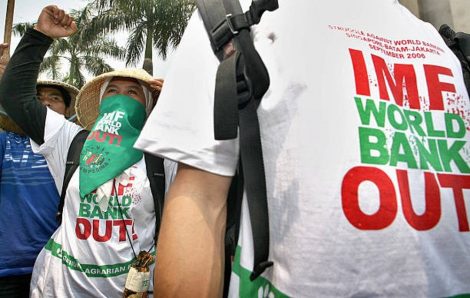The World Trade Organization (WTO) together with a set of free trade agreements, reciprocal protection of investments, multilateral and bilateral agreements have created criminal levels of inequality in global economy, stated the peasant federation to mark the Global Day of Action against the WTO and Free Trade Agreements on September 10.
“Global bodies such as the World Trade Organisation (WTO), World Bank, International Monetary Fund (IMF) that are directly and indirectly promoting a host of multilateral and bilateral trade agreements have created a criminal level of inequality in this world, wherein according to reports, 82% of the world’s wealth is now controlled by merely 1% of the people”, stated La Via Campesina [1] in their call to mobilize.
“Global Hunger is again on the rise, with peoples’ food sovereignty under severe threat. This comes on the back of a seven-decade long persistent push for neo-liberal policies, which called for ‘free market trade’ regimes around the world”, they add. “Privatisation and de-regulation that came about as the consequences of such a push has evidently made the rich richer, while poverty and world hunger continue to remain at staggeringly high levels”.
La Via Campesina considers that these levels of inequality are an “unpardonable offence” that brings into question the existence and legitimacy of these global financial and commercial control institutions, as wells as the packages of agreements and pacts promoted by them. The reason is simple: their track records show that they act to benefit corporations and not the people. Let alone the planet and its sustainability.
Economies, territories and even climate itself thus become victims of the WTO. #WTOkills and #OMCmata were some of the tags used by the organizations that day.
“All that these agreements have ensured is the freedom for Multinational Corporations to dump cheap food into economically weaker countries, after having received heavy subsidies from their rich governments. Such dumping and a push for an industrial agricultural system has ended up treating food grains as a commodity for trade, as a commodity to be speculated upon – with peasants and family farmers unable to meet even the cost of cultivation. It has destroyed rural peasant communities, fishers and our peasant markets. Increased privatisation of services have increased the cost of living, while income levels of peasant households have plunged. The resulting debt has pushed millions of peasants households into deep debt”, stated La Via Campesina International.
This industrial system of agriculture promoted by the “criminal trio of the WTO, the World Bank and the IMF”, continues La Via Campesina, has led to the consolidation and control of the global food chain in the hands of some agribusiness corporations, “while creating devastating impact for the planet, its people and all the living species”.
The date
September 10 was marked as the Global Day of Action against the WTO, the World Bank and the Montetary Fund after in 2003, a South Korean rice peasant, Lee Kyung Hae committed suicide outside the WTO ministerial in Cancun, Mexico. While sacrificing his life to expose the crimes of the WTO and free trade agreements, Lee held a banner reading “WTO kills farmers”.
“Since that day, we have come to mark 10 September as the Global Day of Action Against WTO and Free Trade Agreements, mobilising our peasant members against the assault of global capital and free market regimes. We have denounced WTO at all the ministerial meetings held ever since through direct actions”.
According to La Via Campesina, currently “several multi-lateral and bilateral agreements such as RCEP, CPTPP, EU-Mercosur, CETA and more are being frantically negotiated by countries and global bodies behind closed doors, with no respect to democracy and national sovereignty”
Lives and instruments
Tchena Masso of La Via Campesina said in an interview with Real World Radio that the struggle against the WTO and satellite bodies “is simply a struggle for life itself” that “is being threatened by transnational free trade”.
From Brazil, the member of the Movement of People Affected by Dams (MAB) linked this important date for peasants with the actions in Geneva, precisely at the Human Rights Council, for a binding treaty that limits the impunity of transnational corporations.
In the case of Brazil, which is amid presidential elections with a kidnapped popular candidate and that has been suffering an institutional breakdown since the coup that ousted Dilma Rousseff, Michel Temer´s administration, for instance, created a financial institution based in the US to favor the installation of companies in Brazil.
